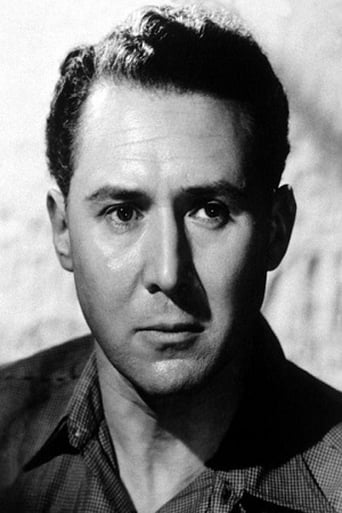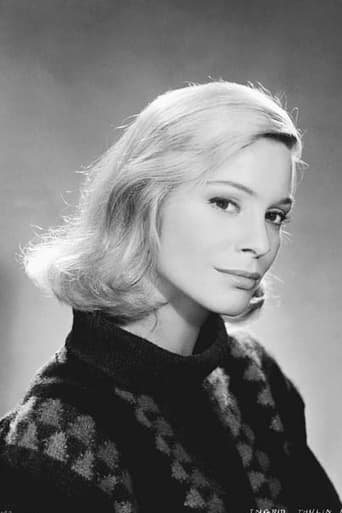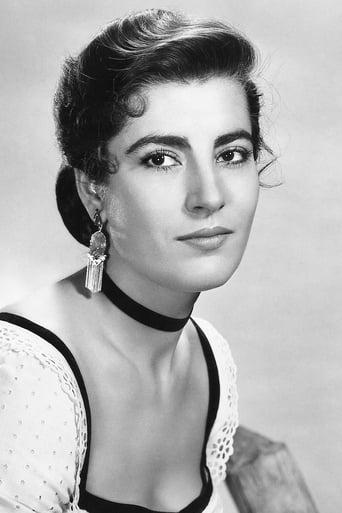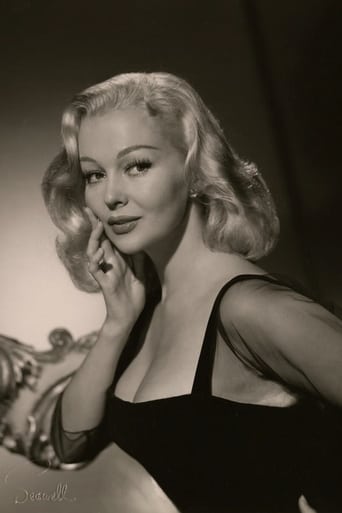bkoganbing
The main thing that I liked about Moses The Lawgiver was that it dealt with a lot of what Cecil B. DeMille in his twice told tale failed to cover. A lot of things happened to the Israelites before they're allowed to cross the Jordan into Canaan. DeMille skipped over that whole part of the story. Of course it doesn't have the splashy spectacle that so typifies DeMille, but there's a lot to be said for this made for TV mini-series.Burt Lancaster as Moses is not the commanding presence nor does he speak in arcane dialog as Charlton Heston did. He leads by persuasion and example and he has more than one reason to think those Hebrews are a 'stiff necked people'. The character of Aaron given short shrift by DeMille is more fully developed and played here by Anthony Quayle.It was certainly a 20 year trial for Moses leading this bunch. These people did see this man come through for them many times in a crisis and still they carp and complain. Lancaster becomes irritable in a way Heston didn't and wouldn't. It's a more human Moses.Bible scholars will praise this interpretation of the story, but the masses will still love their DeMille.
Deusvolt
I saw only the original broadcast mini-series and I was very moved and impressed. Burt Lancaster's portrayal of Moses is very natural, very human unlike the wooden Hollywood versions and I specifically recall Charlton Heston's acting as if he were on-stage in The Ten Commandments. Not Heston'fault though but Cecil B. De Mille's because practically all of the actors and even the extras in that movie acted that way. In some scenes they looked as if they were posing for Rembrandt's Night Watch painting.Not in this Lancaster version though which portrays Moses with all his faults - his short temper and even disobedience to God. But in one scene where the people of the Exodus were celebrating their deliverance and Aaron worried that they were about to fall into orgiastic idolatry again, Moses showed practical wisdom and said: "Not this time" and allowed the festivities to go on. This TV movie mini-series is really more of a religious and philosophical education rather than mere entertainment.
hansbearnl
I had high hopes when I bought this. Who knows, Burt Lancaster is not just any actor. But oh, was I wrong. Even though you have to consider the time (1974) when there were no blue screen and visual effects departments like in these days, the editor did a bad job. Beside that there more flaws. Simple things like 2 different baby's Moses... and the biggest question: where did the director get the story from? You don't have to believe in the Bible to watch this movie, but even then, the whole movie is based on things that are pure imagination of the director but have nothing to do with any of the biblical stories, or even Jewish tradition. It was a huge disappointment, and I advise everyone if they want to see a good movie, and closer to reality, to watch the movie classic the Ten Commandments.
Cristi_Ciopron
It is completely erroneous (and useless) to try grouping together films totally unrelated like the big—budget Antiquity themed Hollywoodian movies, the Italian muscle-men flicks of the '50—'60s, the various epics, the swashbucklers, the exotic movies about non—European civilizations, history, fantasy, myth, literature and adventure, legends and plays, the religious or religion—themed films, Gibson's movies, the Italian TV Biblical biopics, Ivanhoe, adaptations, historical films, fantasy and mythological productions, Middle Ages outings—in a word, every movie set before the last century, under the pretext that they have something in common. Nothing links them; they are unrelated—Gibson's films, SPARTACUS, BEN—HUR, IVANHOE, the many Maciste/ Hercules/ Samson etc. Italian flicks, BLACK ROBE, MONTE CRISTO, etc.. This is not even eclecticism—it is chaos.This Lancaster epic is a transitional movie—between the big—budgeted blockbusters of the '50s—'60s,and the small decent honest TV Biblical stories of the '90s. The film is not very inspired, nor very appealing; its main merit is the cast. Lancaster performs in a conventional Hollywoodian way the disconcerting and enigmatic Old Testament prophet. Another epic from the same transitional period is MASSADA, which boasts O'Toole's high voltage, decadent, picturesque role. MOSES looks and feels more like the '60s epics. One quality is the feel of the tepid tiring crossing of the desert, the tough experience of dwelling for decades in the wilderness. Quayle also reminds the '60s epic blockbusters. Mrs. Papas is reliable as ever. The atmosphere is not the lesser accomplishment of MOSES. The probably ugly experience of the desert's crossing, after the initial exultation of the glorious escape, is well captured and rendered. In this respect, it's a resolute depart from the previous epics' habits. It's not triumphal in what it depicts; it shares the feel of its subject. The Hollywoodian conception behind all such epics (this one is a TV production, nevertheless ) is objectionable; yet the movies remain interesting and worth--wile.In sum,this is the exodus as seen from below, from the common people involved in the exodus POW.Recommended.





